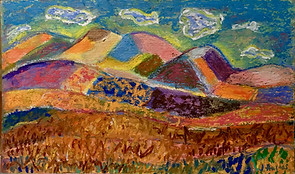Joan Hughes Art
Contemporary & Wearable Art
Life as Art and Art as Life
The way I paint is quite similar to the way I like to live my life. Let me explain.
There are many artists who begin a painting with a clear vision of the end in mind. They carefully lay out the design and may do a simple underpainting and start building from there. In their lives, they are likely very organized and strategic.
I take a very different approach. I'm not a strategic person. Nor can I say that I am naturally well organized. You might say that I move forward based on what I feel prompted to do. In my painting, I sometimes start with a rough idea of a painting in mind. But not always. Sometimes, especially with my abstract art, I just put one or many marks on the canvas and see what next step that calls me to take, and I continue from there, not knowing where I'll be taken.
At one point, the dynamic that is developing between colours and shapes and other marks guides me to the next thing and then the next thing and then the next thing that the painting calls me to do, until it's complete. Complete means, totally resolved and satisfying.
Depending on my mood, I might just tear into a work, completely unconscious of what I'm doing, allowing myself to "make a mess", with the objective of simply covering the canvas. When it's covered, I stand back and see what I've done. It's a bit like writing without stopping and coming back to edit the text and put some order into it. I'm looking for signs of suggested rhythms, transitions, movements, and so on, so that I can know where I need to go in order to make the painting work.
It's also similar to composing music. I follow the melody and interweaving rhythms and make sure that all of the different "lines" are complete, with no missing notes. A missing note could be a colour in a sequence or texture or shape or value that is missing and causing a kind of empty place or lack of resolution in the painting. This phase can take a long time to complete. With each new note, the balance is changed and then another note is identified as being missing. I often have to walk away and take a break from the painting so that I can actually see where the missing note needs to be filled in.
Occasionally - and accidentally - when things go right at each step, a painting can be completed quickly and almost magically. Most, however, need many returns in order to fine-tune what has happened and take it to a coherent completion.
Then there are paintings that just don't seem to ever work out.
When that happens, I have a choice. I can give up on it and throw it out. Or I can put it away, possibly using it as the base for a new painting (if it's in acrylic), or I can keep poking away at it until I am happy with the result.
Below is an example of when I just kept trying and trying and trying to get something that I found pleasing, not able to put it away until I felt it was resolved. This took many visits to the painting.
I'll take you on a bit of a tour to show you what was going on.



1. I started from a charming sketch I had done in Greece. I don't have that sketch, but this is the first rendition I did of it in oil pastels. This did not turn out to be a quickly composed and resolved painting.
At one point, I realized that the very layout of the painting from the start is what caused the struggle, but I decided to go with it anyway.
2. You can see the changes I made here - in the sky, the hills, and the field in foreground. I found the colours in the field muddy in version #1.
3. Here, I'm was trying to bring some interest through greater contrasts into the foreground. I also added textures to the sky.

4. The painting is not speaking clearly to me. It's boring. However, I keep trying to see what is required to make it work. I'm getting very self-conscious and I know that I'm trying too hard.
It would have been a good idea for me to put it away for a few days at this point and work on something else, but I didn't. I got obsessed with "fixing it" and kept hacking at it trying to get it right.

5. The next day I come into the studio fully charged, out of my head and ready to let go of all caution and tear into the painting with abandon. You can see I've made a lot of changes.
